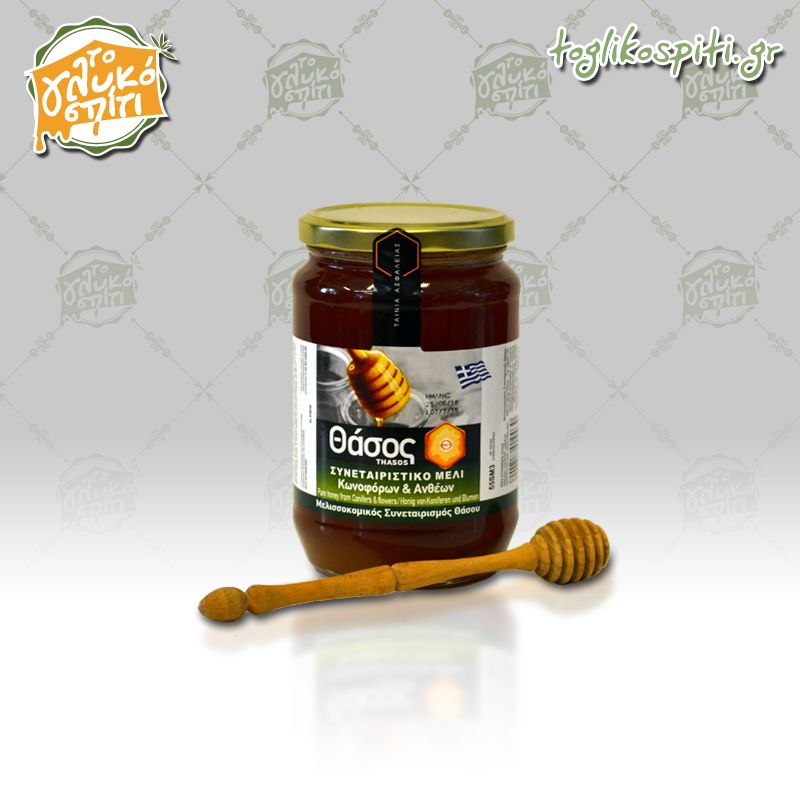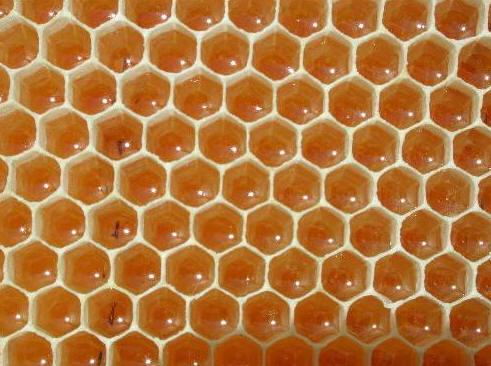Traditional products - pine honey
This year we bought the Thassos pine honey, recommended by Ana Kostić, member of Nikana team. Dark color, different taste of any other honey we had chance to try so far, described by one word - excellent.
I thought that the best place to buy it was the shop of Beekepers Association that we found by visiting Potos. A number of breeders formed an association to standardize the quality of their products. On the wall there is a map showing Thassos and the third peninsula of Chalkidiki. On my question why there is the third peninsula on the map, they answered that the breeders are from Thassos, but some of them take their hives to Athos.
Only after I began to think about why this honey is so special and whether it is just a well-established ad. According to one man on Thassos, nature was generous in every aspect. The ancient Greeks used honey as a sweetener, because they did not know about any other type of sugar. The tradition of beekeeping has preserved, naturally, to the present day, considering the richness of the coniferous forests that cover the island.
One of the reasons for recommending Thassos pine honey lies in the fact that there are endemic pine species Pinus brutia that inhabit the coastal part and Pinus pallasiana at higher altitudes (Zaghi, 2008). There are, of course, on the other locations in Greece, especially on the Aegean islands, but their geographical isolation also makes every population genetic diverse (Panestos et al, 1998). Forest fires are, unfortunately, the inevitability of such locations.
Research has shown that, despite this, coniferous forests recover with a satisfactory degree, but also that human intervention is both necessary in planting, as well as in precautionary measures for causing fire (Spanos et al, 2009). The accent is placed on pine honey, as well as throughout Greece where 55-60% of honey production is based on pine honey (omse.gr). Pine honey is a type of product called the honeydew and like that is registered in both Greece and Serbia (tehnologijahrane.com). It should not be confused with the products from the household activity in which sugar is added and for whose production bees are not necessary; the products made of burgeons, buds and needles and have a certain healing effect, but can not be called honey.
Another reason for recommending a pine honey from Thassos lies in the fact that bees suck the sweet excrement like the wax of the insect Marchalina hellenica, hidden in the cracks of the trees (more on Pinus brutia and less on Pinus pallasiana) and below the white cotton. This insect lives in the eastern Mediterranean region, mainly in Greece and Turkey, and since 2006 it has been on the European and Mediterranean list of plant protection warnings. In the recent years reduction of the quantity of honeydew has been noticed, but since the cause of the occurrence of this phenomenon has not been revealed, this has led to concern among the producers of honey. Throughout Greece, honey producers began artificially infecting forests with this insect, but this led to the loss of balance between Marchalina hellenica and their natural predators, so the forests are overburdened with this insect and are slowly dying.
I did not find the information that this was happening on Thassos and I hope that I will not come across such data. Experts have described that given the low concentration of sugar this honey is not too sweet, its aroma is special and can be compared with iodine flavor, it usually has a large amount of metal and minerals (calcium, magnesium, zinc, iron, copper etc.) (honey-center.gr). I did not know how to describe it, but I can agree with the description.
The honey we bought has been consumed long ago, but I used to take a spoon of honey and imagined how it brings me closer to the place it was made of. Next time I will surely buy this honey, but I want to try thyme honey for which I already know some properties, and it is an integral part of Mediterranean cuisine.
We also wrote about honey and traditional products from Thassos, as well as recommendations on where to get them, in the texts here:
Pine honey from Thassos
Greek honey - one of the best in the world
Or watch the video on our YouTube channel by clicking here.
The most comprehensive offer of accommodation on Thassos find HERE.
Follow us on our social networks and stay up to date with everything you are interested in about Greece!
Facebook:Nikana.gr
Instagram: @nikana.gr
Tiktok: nikana.gr
Facebook group: Live from Greece
YouTube kanal @NikanaTravel
Write to us at e-mail: nikana@nikana.gr
2 comments
Post a Comment
NOTE
All your questions in the comments will receive an answer via email so check your inbox shortly after you posted comment. For more detailed questions and responses, contact us via mail nikana@nikana.gr.









Ivana Novakovic02.07.2022 06:36:02
Kupili smo med od borovih iglica u proverenoj radnju u Metamorphosisu.
Milan05.07.2020 10:23:36
Gde kupiti borov med koji je 100% prirodan? Gazda kod kog smo odseli je već pitao trojicu prijatelja kod kojih se inače snabdeva, ali oni trenutno nemaju. Tokođe, ne može da garantuje za ovaj koji se prodaje po različitim turističkim radnjama, a ne bih da rizikujem. Hvala, Milan